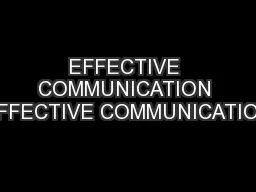PPT-Writing an Effective Abstract
Author : sherrill-nordquist | Published Date : 2015-10-13
RC Arora Research Summer School July 10 2015 Why it is important It is the first section that is read by journal editors Can make or break if your manuscript
Presentation Embed Code
Download Presentation
Download Presentation The PPT/PDF document "Writing an Effective Abstract" is the property of its rightful owner. Permission is granted to download and print the materials on this website for personal, non-commercial use only, and to display it on your personal computer provided you do not modify the materials and that you retain all copyright notices contained in the materials. By downloading content from our website, you accept the terms of this agreement.
Writing an Effective Abstract: Transcript
Download Rules Of Document
"Writing an Effective Abstract"The content belongs to its owner. You may download and print it for personal use, without modification, and keep all copyright notices. By downloading, you agree to these terms.
Related Documents









![[EBOOK] - 180 Days of Writing for Fourth Grade - An Easy-to-Use Fourth Grade Writing](https://thumbs.docslides.com/901130/ebook-180-days-of-writing-for-fourth-grade-an-easy-to-use-fourth-grade-writing-workbook-to-practice-and-improve-writing-skills.jpg)
![[DOWNLOAD] - 180 Days of Writing for Sixth Grade - An Easy-to-Use Sixth Grade Writing](https://thumbs.docslides.com/901243/download-180-days-of-writing-for-sixth-grade-an-easy-to-use-sixth-grade-writing-workbook-to-practice-and-improve-writing-skills.jpg)
![[EPUB] - 180 Days of Writing for Second Grade - An Easy-to-Use Second Grade Writing Workbook](https://thumbs.docslides.com/901424/epub-180-days-of-writing-for-second-grade-an-easy-to-use-second-grade-writing-workbook-to-practice-and-improve-writing-skills.jpg)
![[EPUB] - How to Be a Happy Academic: A Guide to Being Effective in Research, Writing](https://thumbs.docslides.com/903358/epub-how-to-be-a-happy-academic-a-guide-to-being-effective-in-research-writing-and-teaching.jpg)
![[READ] - The Only Writing Series You\'ll Ever Need - Grant Writing: A Complete Resource](https://thumbs.docslides.com/905612/read-the-only-writing-series-you-ll-ever-need-grant-writing-a-complete-resource-for-proposal-writers.jpg)
![[EBOOK] - Ecologies of Writing Programs: Program Profiles in Context (Writing Program](https://thumbs.docslides.com/906283/ebook-ecologies-of-writing-programs-program-profiles-in-context-writing-program-adminstration.jpg)